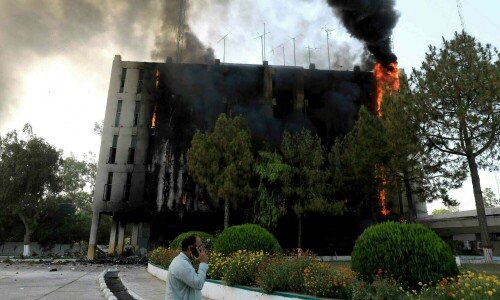ISLAMABAD: The International Monetary Fund (IMF) has forecast Pakistan’s economy to grow by 3.2 per cent during the current fiscal year, falling short of the government’s budget target but surpassing projections by two other leading multilateral organisations.
This growth rate is expected to be accompanied by a single-digit inflation rate of 9.5pc and a current account deficit nearing 1pc.
In its World Economic Outlook (WEO-October 2024) released on Tuesday, the IMF also estimated global economic growth to stabilise at 3.2pc after “winning the battle against inflation”, despite ongoing risks related to regional conflicts, a slowdown in China, and the lasting effects of tight monetary policies and financial market volatility.
The IMF, which recently approved a $7 billion bailout for Pakistan, expects the country’s growth rate to gradually improve to 4.5pc by 2029. In contrast, both the World Bank and Asian Development Bank project Pakistan’s growth rate for the current fiscal year at 2.8pc and inflation at the higher side of 10pc.
Forecast falls short of budget target, but surpasses projections by two leading multilaterals
The WEO forecasts Pakistan’s inflation, measured by the Consumer Price Index, at 9.5pc for the current year, decreasing to 6.5pc by 2029, down from 23.4pc in 2024. The current account deficit is expected to remain flat at 0.9pc of GDP this year and in 2029, compared to a low of 0.2pc last year.
The IMF also predicts the unemployment rate to decline to 7.5pc next year from 8pc in the current year, though it did not explain how these figures were determined, given that Pakistan’s last labour force survey was conducted in FY21.
Global growth
The WEO anticipates global growth to remain stable yet subdued at 3.2pc in 2024 and 2025, virtually unchanged from July 2024 estimates. Notable revisions include upgrades for the United States that offset downgrades for other advanced economies, particularly the largest European countries.
In emerging markets and developing economies, disruptions in production and shipping of commodities — especially oil — along with conflicts, civil unrest, and extreme weather events have led to downward revisions for the outlook in the Middle East, Central Asia, and Sub-Saharan Africa. These declines have been partially offset by positive forecasts for emerging Asia, where strong demand for semiconductors and electronics, driven by significant investments in artificial intelligence, has spurred growth.
The risks to the global outlook are tilted to the downside amid heightened policy uncertainty. Sudden surges in financial market volatility — similar to those experienced in early August — could tighten financial conditions and impact investment and growth, particularly in developing economies with large near-term external financing needs, potentially triggering capital outflows and debt distress.
Further disruptions to the disinflation process could be instigated by new spikes in commodity prices due to persistent geopolitical tensions, complicating central banks’ ability to ease monetary policy and posing significant challenges to fiscal policy and financial stability, according to the WEO.
A deeper or prolonged contraction in China’s property sector, especially if it results in financial instability, could weaken consumer sentiment and create negative global spillovers given China’s significant role in global trade.
An intensification of protectionist policies could heighten trade tensions, reduce market efficiency, and further disrupt supply chains. Rising social tensions might lead to unrest, undermining consumer and investor confidence and potentially delaying necessary structural reforms, the WEO concludes.
Published in Dawn, October 23rd, 2024














































